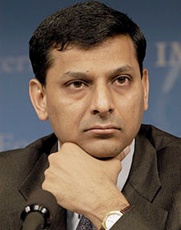Rajan calls for rethink on developed world’s monetary expansionism
12 May 2016
Raghuram Rajan, governor of the Reserve Bank of India (RBI), has called on his counterparts in the developed world to own up responsibility for shaking up the global financial system through their expansionary monetary policies, even as he foresaw India emerging as one of the top five global economies over the next 10 years.
 Central banks in developed economies have ventured into new territories in recent years, adopting a range of novel measures, including quantitative easing and negative interest rates, in a bid to boost an economy where growth remains weak and inflation rates are low. But those policies appear to be having little impact on their domestic demand, Rajan said in a speech at the London School of Economics.
Central banks in developed economies have ventured into new territories in recent years, adopting a range of novel measures, including quantitative easing and negative interest rates, in a bid to boost an economy where growth remains weak and inflation rates are low. But those policies appear to be having little impact on their domestic demand, Rajan said in a speech at the London School of Economics.
Delivering a lecture on 'Rethinking the Global Monetary System' at the London School of Economics, Rajan said, ''We really don't have anything in place today.''
Repeating his warning over the adverse spillover effects of aggressive monetary policies by central banks, he said, ''First reaction of any such thing is yes, this is a guy from an emerging market which has no international responsibility.''
But, he said, ''The fact that the policies in some industrial countries affect sentiment in my markets on a daily basis is something that was not intended by them. (But) it is a fact of life and we need to deal with this because it puts constraints on policy in my country''.
He said monetary stimulus decisions of the US Federal Reserve and Japan's central bank are capable of creating market volatility in excess of 2 per cent as market indices in India and other developing countries look to the US, Europe, Japan and Shanghai for cues.
Rajan said the way forward is for developed nations to assume more international responsibility, adding, ''The answer is, by the time any of this gets made into policy, I have no doubt India will be one of the top three or five global economies. I think it is time we started this discussion.''
But, he said, more analysis must be done by unbiased experts in academic institutions on the net spillover effects.
''We need rules of the game based on how policies play out in the short term versus long term, whether they have positive or negative effects on the rest of the world, and whether they are clear or fuzzy,'' Rajan said.
''And here we can use the same analogy as the WTO, we can ascribe colours to policies. Those that have net positive effect on country as well as zero to positive effect on the rest of the world gets a green label; policies that are uncertain, short term negative but long term positive, may be more of an orange label, and policies that may be positive for your country but certainly negative for the rest of the world, gets a red label; (other) countries should shun those country's policies''.
Rajan said the global financial system was nowhere near establishing what these policies might be, but once reasonable number of studies are completed, international discussions could begin.
The lecture marked the inauguration of the '100-Foot Journey Club', a collaboration between the Indian high commission and LSE's South Asian Centre.
By reducing the income people expect to earn from their savings, very low or negative interest rates actually spur them to put more money aside for their retirement, or other future purpose. And while quantitative easing raises asset prices, people may expect future declines when that policy is withdrawn, again giving them an incentive to save more, he said.
He said that the latest novelty under consideration – known as helicopter money – would likely have the same flaws, with any giveaway funded by central banks likely being saved rather than spent. ''In these troubled times you run the risk of creating exactly the opposite expectation of the one you intend,'' he said.
''We're reaching the limits of what monetary policy can do,'' Rajan said.
Rajan has long been a critique of the monetary actions of developed-country central banks that have harmful effects in developing economies.
His latest intervention comes as the International Monetary Fund and other international bodies increasingly argue that other kinds of polices are needed to overcome weak economic growth around the world, and that monetary policy is carrying too great a burden.
Economists are uncertain why the global economy has been so weak, and why productivity growth in particular has been so slow, Rajan said, adding that policy makers have failed to answer those questions.
In normal times, Rajan said monetary stimulus weakened currencies, but gave something back to the global economy in the form of higher domestic demand. In recent years, there has been no such compensating boost to domestic demand, and currency depreciations in response to monetary stimulus simply take demand away from other economies, he said.
''We have to move away from the situation where anything goes,'' he said. ''We need rules of the game based on how policies play out, whether they have negative or positive effects on the rest of the world.''


















